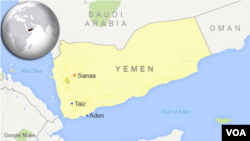Saudi Arabia's foreign minister said Monday that Arab states would take "necessary measures" against Yemen's Houthi rebels if a peaceful solution cannot be found to end their fight against the government of President Abd-Rabbu Mansour Hadi.
Saud al-Faisal told reporters in Riyadh that Arab countries would try "to protect the region from aggression" and he condemned what he called Iranian "interference" in Yemen.
Faisal insisted the only solution in Yemen was for the country's "legitimate government to be allowed to exercise its authority and for Houthi rebels to evacuate all government institutions they have occupied."
Meanwhile, Yemen Foreign Minister Riad Yassin said Hadi has asked neighboring Arabian Gulf countries to intervene militarily against the Shi'ite Houthi rebels who seized the capital, Sana'a, in September and now are advancing south toward Hadi’s base in Aden. He fled there from house arrest in Sana'a last month.
In a separate briefing, Yassin told Saudi media outlets that "time is not on our side." He said the Houthis must be stopped but did not say what any military intervention would entail.
Iranian-allied Houthis, who had agreed to share power with Hadi after they seized the capital in September, took over the southern city of Taiz on Sunday. Taiz is about 180 kilometers (110 miles) northwest of Aden.
Houthi fighters repelled
Troops loyal to Hadi on Monday fought off dozens of Houthi rebels who’d been sent toward Aden, militia and security sources said. Security officials said the rebels had sent several thousand troops south and fought around dawn Monday with local Sunni tribes as they approached Aden.
Iranian-allied Houthis, who had agreed to share power with Hadi after they took control of the capital six months ago, on Sunday captured the city of Taiz, about 180 kilometers (110 miles) northwest of Aden.
The Houthis' entrance into Taiz "brings the country dangerously close to a full-fledged civil war, with potentially wide-ranging sectarian implications," Sigurd Neubauer, a fellow at the Arab Gulf States Institute in Washington, told VOA. That could include forcing Sunni tribesmen to "forge alliances” with al-Qaida in the Arabian Peninsula.
"The Houthi advance into Taiz comes as the group has already solidified its access to the Red Sea, with Saudi Arabia fearing that Iran seeks to consolidate its regional influence by stoking tribal and sectarian tensions from the strategic Bab al Mandeb Strait through the Red Sea to the Gulf of Aden," Neubauer said.
Britain pulls special forces
The growing unrest prompted Britain to evacuate its last special forces from Yemen, a person familiar with the matter told Reuters Monday.
The person, speaking on condition of anonymity, said the special forces had been extracted in recent days. The defense ministry said it never comments on such matters.
Britain withdrew staff from its embassy in Yemen last month and temporarily suspended operations there over security concerns.
U.S. officials announced Saturday that all remaining U.S. personnel had been evacuated from Yemen, a day after two suicide bombings claimed by the Islamic State group killed 137 people in two mosques in Sana'a.
The U.S. State Department said in a statement that the temporary removal was due to “the deteriorating security situation in Yemen.”
Meanwhile, the growing unrest led the U.N. Security Council to call an emergency session Sunday.
U.S. Ambassador to the United Nations Samantha Power urged all of the rival parties in Yemen to return to U.N.-mediated peace talks.
Power, in a statement issued after the emergency security council meeting, said that the Houthis' actions "have consistently undermined Yemen's transition" and that the council reaffirmed its support for Hadi.
"These attacks are but the latest in a series of violent actions perpetrated by the Houthis since they chose to overrun Sana'a, take over government institutions and attempt to govern by unilateral decree," Power said. "To preserve Yemen's security, stability and unity, all parties must refrain from any further unilateral and offensive military actions."
The U.N.'s special envoy for Yemen, Jamal Benomar, warned the council that events were pushing the country "to the edge of civil war.''
Houthis take over Taiz airport
The Houthi militias, who are opposed to Hadi, took control of the military airport in Taiz without a struggle from local authorities late Saturday. They patrolled parts of Taiz Sunday, with Houthi gunmen firing shots into the air to disperse protestors demonstrating against them.
Hours after the takeover, the rebel leader Abdel-Malik al-Houthi vowed to send his fighters to the south. In a televised speech, he called Hadi a puppet to international and regional powers who want to "import the Libyan model" to Yemen.
He named the United States, Israel, Saudi Arabia and Qatar as conspirators against Yemen and other countries in the region.
Yemeni security officials say the rebels are backed by supporters of former President Ali Abdullah Saleh. Yemen has sunk into violence and chaos since a popular uprising ousted Saleh, the longtime strongman, in 2012.
VOA correspondent Edward Yernian in Cairo and Yemen stringer Jafar Kukay in Sana’a contributed to this report. Additional material came from Reuters and AFP.






